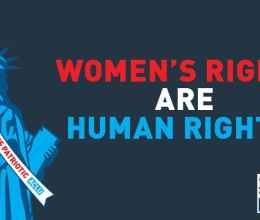The City of Escondido’s law requiring the public to apply for a permit two months in advance of their special event violates the First Amendment, said the ACLU of San Diego & Imperial Counties in a letter sent to the city attorney today. The Escondido ordinance unlawfully fails to exempt spontaneous demonstrations, and its 60-day advance notice requirement is clearly unconstitutional when the special event involves political speech or other expressive activity. The law also opens the door to unconstitutional content-based discrimination by potentially allowing the City to consider the reaction of others to protected speech in denying or revoking a permit or requiring event organizers to pay for the actions of others.
The San Diego ACLU became aware of problems with Escondido’s permitting policies when the organization applied for a permit for a voter registration and get-out-the-vote event at Grape Day Park on September 25, 2012, to coincide with National Voter Registration Day. A city staff member told the San Diego ACLU that the event would require at least 60 days advance notice, and declined to accept the application.
“It is ironic that a special event celebrating the essence of America would be denied approval because of an unconstitutional, and unnecessarily bureaucratic ordinance,” said David Loy, legal director of the San Diego ACLU. “Escondido’s law cuts against the grain of the First Amendment in a number of fundamental ways.”
Overall, Escondido’s ordinance represents an illegal prior restraint, pitting the public’s right to protected expression against the government’s power to approve or disapprove an application. On a number of fronts, the city’s current ordinance violates First Amendment protections:
EVENT SIZE
A city does not need to require a permit at all unless an event is expected to be so large that it would present serious traffic, safety, and competing use concerns. The Ninth Circuit Court of Appeals recently held that a group of 75 is large enough to warrant an advance notice and permitting requirement in some cases, but for large open spaces, such as a major park, the Court said such requirements “might be unconstitutional even for groups of seventy-five.” Escondido’s ordinance apparently applies to “any parade or special enterprise” regardless of the size or the nature of the event, or its impact on traffic flow or public use. The ACLU has asked the City to clarify this key issue to prevent First Amendment problems.
60-DAY ADVANCE NOTICE
Even if a permit is required, the obligation to apply 60 days in advance is clearly unconstitutional for political speech and other expressive activity. The courts regularly strike down much shorter advance notice requirements, and the outer limit for notice of events of this nature seems to be three days. Any claim that the City has limited staffing and resources to process permit requests does not pass constitutional muster because the government has a fundamental duty to uphold First Amendment rights to freedom of speech.
CLEAR STANDARDS
To meet First Amendment principles, a permit ordinance must have narrowly drawn, reasonable and definite standards for granting or denying a permit. Escondido’s law states that a permit can be denied if the “conduct of the special event will unreasonably interfere with the public peace, health, safety or welfare.” This opens up the door to unconstitutional content-based discrimination, potentially giving Escondido the ability to impose an unconstitutional “heckler’s veto” on a permit. Speech may not be restricted on the ground that others may react with disorder or violence.
The ordinance is also troubling in that it seems to permit the City to cancel, restrict or modify permits “to facilitate or accommodate any other duly approved or permitted special event, celebration or activity.” But by the very nature of requiring the public to apply for a permit, any such scheduling conflicts should be non-existent. Once a permit is issued, there should no longer be any concerns about accommodating multiple users of a given location. To retain the unfettered ability to cancel or otherwise modify a permit creates the unacceptable risk of content or viewpoint discrimination.
FEES, INSURANCE AND INDEMNITY
The law prohibits a municipality from profiting fees imposed on the exercise of a First Amendment right. Fees are only allowed to cover the actual administrative expenses of the permit. Unless closely linked to defraying administrative costs, a permit fee amounts to an illegal tax on protected speech. Even worse, the ordinance says that an applicant may be required “to compensate the city for any incidental costs associated with the event, including but not limited to…any necessary or appropriate fire, police, paramedic,…or other services connected to or made necessary by the event.” This requirement could potentially hold event organizers financially responsible for the reactions of third parties to their speech. The Supreme Court struck down such recoupment, saying that the government may not “recoup costs that are related to listeners’ reaction to the speech” because free expression cannot be limited because “a hostile mob” might be offended.
The ordinance also improperly requires all special event organizers to hold the city unaccountable for “any personal injury or property damage” at the event, and to insure Escondido for amounts to be determined by the city council. Clearly this clause is impermissibly broad. It contains no exclusion for such expenses based on the reaction to the organizers’ expressive activity; it requires the organizers to waive their right to hold the city liable for its otherwise actionable conduct; and it illegally requires organizers to assume legal and financial responsibility for harm caused by hecklers, counter-protesters or other people not connected with the event.
The City of Escondido’s city attorney has contacted the San Diego ACLU. We look forward to a constructive dialogue that we hope will solve these First Amendment problems, however, litigation remains an option if necessary.
Escondido’s Special Events Permitting Ordinance Unconstitutionally Restricts Free Speech
Related Issues
Related content
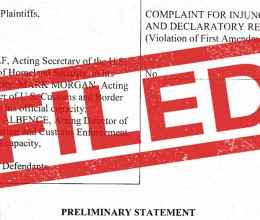
Journalists Sue Federal Government to Defend Free Press in ACLU...
November 21, 2019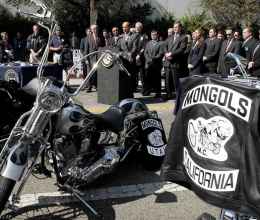
The Justice Department Wants to Strip the Mongols Biker Club of Its...
February 25, 2019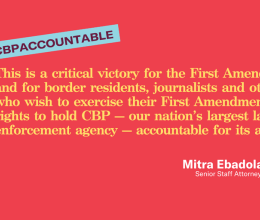
ACLU Statement on Ninth Circuit Decision Affirming First Amendment...
August 14, 2018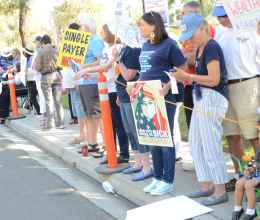
ACLU: CA Law Used to Cite Drivers Who Honk Their Horns During...
June 12, 2018ACLU Wins Suit Over Individuals’ Right to Protest and Monitor...
February 13, 2018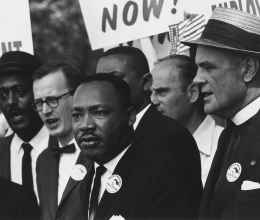
ACLU Condemns El Cajon’s ‘Food Sharing’ Ban and Subsequent Arrests...
January 15, 2018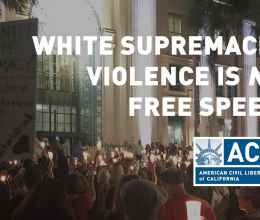
ACLU of California Statement: White Supremacist Violence is not...
August 16, 2017ACLU: City of Vista Must Permit Peaceful Protests Outside Rep....
June 1, 2017